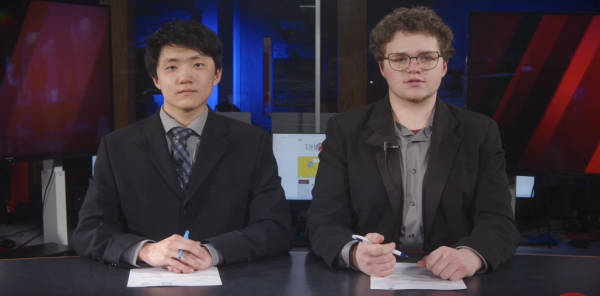New AP U.S. history curriculum sparks controversy

HISTORY IN THE MAKING: Peter Huff teaches one of his U.S. History classes. Huff believes that students will benefit from the new focus of the curriculum.
This past summer the College Board, the company responsible for the SAT, SAT II Subject Tests and Advanced Placement exams, made some major changes to its Advanced Placement U.S. History mandated curriculum. While the new format initially garnered some support, it has recently been under public scrutiny for omitting certain “important” American historical events, facts and people.
New York Times reporter James R. Grossman wrote about disdain for the new curriculum.
“A member of the Texas State Board of Education has accused the College Board of ‘promoting among our students a disdain for American principles and a lack of knowledge of major American achievements, like those of the founding fathers and of the generals who fought in the Civil War and World War II,” Grossman wrote.
Peter Huff has been teaching history at DHS for the past 28 years and teaching AP U.S. History for the past 12.
“The biggest shift is more on process. [The College Board] want the kids to focus more on history with even more of an emphasis on documents. They got rid of the DBQ [Document based question] and now utilize a short answer question that related to a document,” Huff said.
According to collegeboard.org, the new curriculum focuses on seven required overarching themes and nine time periods, with three key concepts per time period. On the other hand, the old curriculum consisted of 12 themes suggested, not required, to structure the course and 28 periods with suggested topics.
Teachers were required to write new curricula and submit them to the College Board to receive approval. This process is called the AP Audit and is meant to both “Provide AP teachers and administrators with clear guidelines on curricular and resource requirements that must be in place for AP courses” and “Give colleges and universities confidence that AP courses are designed to meet the same clearly articulated college-level criteria across high schools.” The minimum length of these proposals were, on average, 30 pages long.
“Many things that students are learning today are 10, 20 maybe even 30 years out of date, and so while change isn’t easy, students are ultimately benefiting from the changes implemented by the College Board,” Huff said.
Some of these changes include a greater emphasis on Women’s History, Native American History and African American History, which has caused some controversy.
“James Madison, Thomas Jefferson and the other founders are largely left out of the new test, unless they are presented as examples of conflict and identity by class, gender, race, ethnicity, etc. The Constitution can be studied as an example of the Colonists’ belief in the superiority of their own culture, for instance. But any teacher who presents a full unit on the principles of the American Constitution taught in the traditional way would be putting his students at a severe disadvantage. So while allowing some minor flexibility on details, the new AP U.S. History framework effectively forces teachers to train their students in a leftist, blame-America-first reading of history,”Dallas News reporter Stanley Kurtz wrote in “Time to Oppose New AP U.S. History Exam is now.”
However, not everyone feels that the new curriculum is moving in the wrong direction.
“Ultimately, the shift of the curriculum is meant to reflect current historical scholarship, and I think it does,” Huff said.
DHS students currently enrolled in AP U.S. History are serving as beta testers for the new curriculum, and most have favorable experiences to report.
“In class, we read two different articles, one from each point of view, about the change. One big change is that [The College Board] aren’t focusing on the facts as much more reading and becoming aware of different viewpoints of historical events,” Junior Shale Mack said. “I really enjoy the class so far.”
“The class is actually really interesting, and after taking the first test, I realized that not only do I have to know the basic history, but I also have to know the events impacting that instance in history.” Junior Alana Hirsch said.
A common misconception held by some DHS students last year was that the newer curriculum would be easier, and was put in place by the College Board in order to make more money.
“That is a complete myth. The new curriculum in some ways causes the student to have to think even more critically, and while some short answer questions are based on a quote, in order to answer those questions correctly, students need to have an understanding of the history based around that quote. Therefore, it would be even more challenging, I believe, to take this test and do well without taking the course,” Huff said.
According to University of Colorado Boulder professor Fred Anderson, one of the creators of the framework for the new curriculum, the updated course is designed to give students a more realistic “college style” class.
“[Revisionist history is] just a pejorative term–it’s not substantive, because history is just constantly, always being revised. The idea behind this framework was simply to be as inclusive as possible, and that means that things that make some people uncomfortable about American history should also be included,” Anderson told Denver Channel 7 News.
“It takes time for change to be accepted. Like I previously said, the students that will be benefiting from this shift will no longer be learning in an outdated way. Therefore, the students will be better prepared for college because this is the material that they will be covering” Huff said.
The College Board refused comment.





